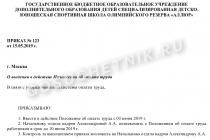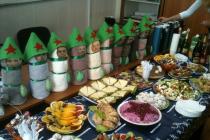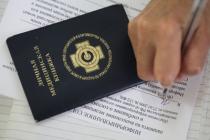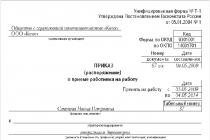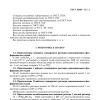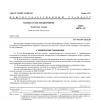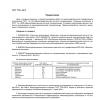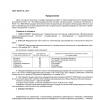It would seem that what can combine drugs and auto racing? If we discard the likely accidents, then it turns out - business! Billionaire Viktor Kharitonin made his fortune in pharmaceuticals, and now he is multiplying with the help of the Nurburg-ring formula track, which among F1 pilots is listed as “Green Hell”.
Viktor Kharitonin is one of those oligarchs who is trying in every possible way to protect himself and his personal life from funds mass media. That's why early period his biographies, information about his parents, childhood and youth remain inaccessible to the general public.
Even the birthplace of the pharmaceutical magnate remains in question. Some sources claim that he is a native of Novosibirsk, according to others, Viktor Kharitonin's birthplace is Kazakhstan. The only thing that is known for certain is the date of his birth - November 20, 1972.
Education
After graduating from high school in 1989, Viktor Kharitonin entered Novosibirsk State University, where he studied at the Mechanics and Mathematics for five years. Having received a diploma in 1994, the young specialist did not look for a job in his specialty, but immediately went into business, in which he gained experience while studying at the university.


Career and business of Viktor Kharitonin
As a student, Viktor became interested in fartsovka and brought it to the official level by registering his first company, Creditinform, in 1993. In all cases, the partner of the entrepreneur was his fellow student Yegor Kulkov. After graduating from the university, young people went to seek their fortune in Moscow.
The capital received the novice businessman very warmly. Here Kharitonin quickly found fellow countrymen - Alexei and Olga Svirin, who provided him with a partnership in the Profit House investment company. At the same time, Victor bought and sold vouchers, and also studied the laws of the exchange game.
Among Kharitonin's clients were the pharmaceutical companies Vremya, later renamed Pharmacy Chain 36.6, and Domestic Medicines, which later became the Valenta holding.
Kharitonin's education and entrepreneurial talent allowed the businessman to head Profit House in 1995. Four years later, his investment company began to interact with Milhouse Capital, owned by Roman Abramovich.
Thanks to Kharitonin, in 2001, the owners of Sibneft acquired shares in Aeroflot. A friendship began between Kharitonin and Abramovich, which played an important role in the further activities of Viktor Vladimirovich.
Soon the businessman became the head of another investment company in Bashkiria. It was here that the foundation of Kharitonin's pharmaceutical empire was laid. Its beginning was the shares of Ufa-Vita acquired by Viktor Vladimirovich, an enterprise specializing in the production of medicines.
In 2003 after leaving American company ICN from the Russian pharmaceutical market, the companies of Kharitonin and Abramovich took over five factories and almost a hundred pharmacies left over from ICN Pharmaceuticals. Unprofitable enterprises were planned to be consolidated and profitably sold. Thus, the pharmaceutical holding "Pharmstandard" was founded.
Taking up a relatively new business for himself, Viktor Kharitonin quickly got a taste and showed enviable energy. The creation of "Pharmstandard" was started with getting rid of unprofitable assets. The Moscow office and the Yoshkar-Ola Marbiopharm plant, once owned by ICN, went on sale. The next step was the shutdown of the Chelyabinsk and St. Petersburg production facilities and the sale of the 03 pharmacy chain.
In 2006, Kharitonin and Abramovich took over the assets of Masterlek. This pharmaceutical organization has become widely known thanks to Flucostat, Amiksin and Arbidol. The last antiviral drug was of particular importance, since it was the most popular on the Russian market.


Having prepared the holding for sale, Kharitonov decided not to part with his offspring and, thanks to a skillfully conducted IPO, in 2008 became the sole and full owner of the Pharmstandard holding.
By this time, the organization has changed and has taken a leading position in its field. In addition to four pharmaceutical plants, the holding included an enterprise producing medical equipment. In addition, Viktor Kharitonin became the owner trademarks Pentalgin, Complivit, Codelac, etc.
The skillful management of Viktor Vladimirovich saved the holding from problems caused by the global economic crisis. On the contrary, in 2009 Kharitonin's organization almost halved its profits. This was facilitated by the connections and contacts of the entrepreneur, as well as the fact that his organization was entrenched in the top ten largest insulin manufacturers. Three years later, the holding expanded due to the pharmaceutical companies Biomed, Lekko and Pharmpark.


Since the spring of 2014, Pharmstandard's securities have been permanent members of the London Stock Exchange, and the holding itself is the undisputed leader in the production of pharmaceutical products in Russia.
The biography and career of Viktor Kharitonin is not limited to Pharmstandard and stock trading. The businessman took and takes part in scientific developments. One of these projects was the work on the creation of the biotechnological center "Generium", which Viktor Kharitonin carried out jointly with Alexander Shuster since 2007.
Now "Generium" is known far beyond Russian Federation. The center is engaged in the development of drugs aimed at combating cancer, hemophilia and other intractable diseases. Scientists from the United States, Germany, France and others are involved in the activities of the organization.


The center has state-of-the-art equipment and uses innovative technologies. In addition to research work, "Generium" covers the educational sphere. Viktor Kharitonin is the main shareholder and investor here.
As a person who is far from being indifferent to the world of motorsport, in 2014 Viktor Vladimirovich became interested in the fate of the Nuremburg Ring, a track that was one of the stages of the most prestigious Formula 1 car competition.
By that time, she was practically ownerless, and Kharitonin did not fail to take advantage of this opportunity. For €10 million, the entrepreneur bought out 67% of the shares of the racing complex, and in 2016 a deal took place that allowed the businessman to become the sole owner of the Green Hell.
As befits a real businessman, Viktor Kharitonin did not make the Nurburg Ring an expensive toy - the track brings profit to the oligarch.
Everyone can take a ride on the places where the legendary Schumacher drove, on one of the supercars owned by the entrepreneur. Entertainment costs $30 thousand. Moreover, this figure refers to weekdays, the weekend here will cost much more.
Viktor Kharitonin often turned to development activities. In 2010, he controlled the North Tower business center. In 2017, the entrepreneur became the owner of the Gorbushkin Dvor center, having bought out a controlling stake for $0.5 billion. In addition, Viktor Vladimirovich plans to build Bolshoy Novovorobinsky Lane.
A photo of Viktor Kharitonin appeared in Forbes magazine in 2010, and since then, with the exception of 2014, the businessman's name has never left the prestigious rating of Russian oligarchs.


The billionaire’s fixed assets include shares in the Pharmstandard pharmaceutical holding, the Cypriot company OTCPharm, the Severnaya Tower shopping center, etc.
Using the data provided annually by Forbes, you can get acquainted with the dynamics of changes in the state of Viktor Kharitonov over the recent period (year - $, billion / place in the ranking of the 200 richest Russians):
- 2011 – 1,5/70;
- 2012 – 0,95/105;
- 2013 – 1/109;
- 2015 – 0,95/101;
- 2016 – 1/77;
- 2017 – 1,2/81.
In 2018, a businessman with a fortune of $ 1.4 billion settled in 74th position in the ranking.


In addition to elite Moscow real estate, the pharmaceutical magnate owns two apartments in One Hyde Park, the most luxurious residential complex in the English capital. The price of one square meter of living space here is about $124,000.
In addition, the capital of Viktor Kharitonin is located in the Nürburgring racing complex, for which the entrepreneur paid a total of about €70 billion.
Private life of Viktor Kharitonin
Finding out anything about personal life in the biography of Viktor Kharitonin is very problematic. This does not mean that the billionaire is unsociable, he just avoids contact with the press.
A reliable fact is that the businessman is married. His wife Irina Viktorovna was born in 1973. The couple is raising two children.
Of the hobbies of Viktor Kharitonin, the passion for expensive sports cars is most often mentioned. Thanks to this hobby and the German racing complex, the businessman often communicates with his friends, among whom you can see billionaires and influential people, in particular Roman Abramovich, who loves to demonstrate the capabilities of his supercars to the general public.
As for influential friends, the name Kharitonin is often mentioned along with the names of Tatyana Golikova, Deputy Prime Minister of the Russian Federation, and her husband, Viktor Khristenko, ex-Minister of Russian Industry.
Kharitonin Viktor Vladimirovich Kharitonin - Chairman of the Board of Directors of Pharmstandard Holding.
The owner of the closed-end investment fund "Reconstruction and Development".
Assets
The main assets of Viktor Kharitonin are concentrated:
- pharmaceuticals (Pharmstandard holding).
State
Biography
Education
Graduated from Novosibirsk State University.
Career
1999 - founded the Profit-House company which was engaged in operations in the market valuable papers and worked closely with Roman Abramovich's Millhouse Capital.
2001 - bought shares of Aeroflot for the owners of Sibneft.
2003 - together with Roman Abramovich and other shareholders of Sibneft, he acquired the pharmaceutical business from the American company ICN and created the Pharmstandard company.
2003 - became one of founders of Pharmstandard holding.
since 2003 - chairman of the board, member of the board of directors of Augment Investments Limited (owns 49% of shares).
2010 - is negotiating are negotiating the purchase of the Ukrainian pharmaceutical company "Biolek".
2010 - announced its intention to acquire the business center "Northern Tower" (135 thousand square meters) in the MIBC "Moscow City".
2011 - announced its intention to acquire the Donetsk manufacturer of anticancer substances Sinbias Pharma LLC and Onco Generics LLC, which owns a plant for the production of finished anticancer drugs in Donetsk.
Through Trans Nova Investments Limited, he invested €20.9 million in the Danish company Affitech.
Included in the hundred of the richest people in Russia according to the rating of Forbes Russia magazine.
Family status
Married, two children.
Notes
- Viktor Kharitonin collected usable area
- The richest businessmen of Russia - 2012
- The richest businessmen of Russia - 2011
- Pharmstandard co-owner Viktor Kharitonin is negotiating the purchase of a Ukrainian pharmaceutical manufacturer
- Viktor Kharitonin buys the North Tower business center in Moscow City
- Ukraine registered "Pharmstandard"
- Viktor Kharitonin
The new Rupolit.net study will focus on two Viktors, at least one of whom with enviable regularity got into our versions and turned out to be a participant in various theories published in the Ustinov Trollit telegram channel.
Viktor Khristenko, during the time of the codeine pills rampant, served as head of the Ministry of Industry and Trade - tentatively, 2011, which preceded the turning point for Russian system health care in 2012. Khristenko himself was a person capable of exerting pressure and influence and turning any situation to his advantage, but his wife Tatyana Golikova, the former Minister of Health, now, as you know, the head of the Accounts Chamber of Russia, allowed him to achieve even greater consolidation of his own forces.
The head of the Ministry of Industry and Trade in alliance with the head of the Ministry of Health is an extremely dangerous and painful union for Russia, especially if the couple has any specific plans for local medicine. And they appeared, but in order to deploy a terrible plan in full force, a third character was needed, and he also showed up - now right on the Forbes list, Viktor Kharitonin (TIN: 773107276681).
Businessman Viktor Kharitonin began his career in 1994, moving to Moscow after graduating from the Faculty of Mechanics and Mathematics of Novosibirsk University. He arrived, one might say, “to be ready” - in the capital he was called to do business by Alexei and Olga Svirins, acquaintances from Novosibirsk who opened the Profit House investment company.

Information about this activity in all possible biographies of Kharitonin is crumpled and compressed - they say that at the age of 23 he came to work there, at the age of 25 he headed the company. There is other information - that in fact, Kharitonin opened the company together with Yegor Kulkov, a classmate with whom Kharitonin traded consumer goods as a student.
Later, together they bought the UfaVita plant, which they wanted to sell at a higher price, but changed their minds, remembering their ties with Roman Abramovich. Then, at the beginning of the 2000s, Profit House did its best to buy Aeroflot shares in favor of Sibneft. The oilmen managed to be grateful, and in 2003, with the help of Abramovich, Kharitonin bought several enterprises of the American company ICN at once. These plants were at the stage of "dying", however, without paying attention to this special attention business partners Kharitonin and Kulkov quickly added UfaVita to them and began to churn out medicines, calling the company Pharmstandard. By the way, Arbramovich later went out of business by selling a minority stake to Kharitonin.
Russia in codeine frenzy
Neither the volume of production, nor the natural gift for commerce of Viktor Kharitonin could give one hundred percent success - the enterprise could not be called successful, and then a one hundred percent route appeared in the spirit of bootleggers of the early 20th century. Not even from under the counter, but from the very counter they began to sell codeine pills.
The pride of Pharmstandard at the beginning of the 2000s was cough tablets - Codelac and Terpinkod. They were very popular, and the company even launched additional facilities for the production of these tablets.
If you take a lot of codeine-containing drugs at once, you can get a “high”, and in fact, the pills easily turned anyone, from teenagers to desperate adults, into ordinary drug addicts. If in the late nineties the medicine was dispensed only by prescription, then already in 2004 Pharmstandard managed to push through the regulatory authorities, and the drugs went on free sale.
Tablets Codelac and Terpincod were somewhat different from other preparations containing codeine. For example, in the composition of these drugs "Pharmstandard" there were practically no extraneous chemicals, while the drugs cost practically nothing - a drug addict could spend less than two hundred rubles on a dose, these are several packs of pills that were taken at once.
No matter how much one would like to believe that Pharmstandard simply sought to provide the population with an inexpensive cough medicine, nevertheless, sales went off scale (people just don’t cough that much), the practice of selling many packs at once in one hand was widely divergent, and the characteristics themselves drugs are also questionable.
For example, Terpinkod, which contains the highest dose of codeine, and also contains the expectorant terpinhydrate. Thus, the effect of the tablets is such that they at once thin the sputum and suppress the cough, which is a kind of mutual exclusion, incomprehensible to doctors. Moreover, terpinhydrate itself is an obsolete and unproven element that is banned in the West.
Another striking coincidence - Terpinkod was received with great enthusiasm in cities with a severe drug situation. Sales throughout the country were successful, and in cities where there was a hard fight against heroin trafficking, pills completely took the pedestal, setting record sales among medicines in principle. For example, in St. Petersburg, he became a sales leader in the first quarter of 2003 alone.
The codeine situation in itself became a cause for concern, but everything became even worse when drug addicts learned in artisanal, domestic and home conditions to get desomorphine, a strong drug considered 10 times stronger than morphine, from codeine, a weak drug.
Closer to 2009-2010, Russia was swallowed up by desomorphine drug addiction, in other words, codeine admirers switched to "crocodile". This terrible drug is known as a cheap analogue of heroin, from the use of which people soon begin to rot alive, lose their teeth and become covered with ulcers.
This was hardly interesting to Viktor Kharitonin, for many years Pharmstandard continued to brag about the fact that it only manages to increase and increase sales of its drugs, mainly those containing codeine. Through the efforts of television and the Federal Drug Control Service, codeine pills miraculously managed to be included in the list of prescription drugs, but Kharitonin and his company achieved their initial goal: drug money allowed Pharmstandard to break out into the industry leaders.
Business on cancer patients
It would seem that the worst is over and you can exhale, but we assure you that Kharitonin and his comrade Viktor Khristenko still have interesting details from joint activities. More precisely, in this situation, Tatyana Golikova played the main role, who helped Kharitonin get Russian cancer patients.
The situation dates back to 2009, when Golikova served as Minister of Health of Russia, and Kharitonin's company imported the expensive American drug Velcade, intended for the treatment of cancer.
But for Viktor Kharitonin and his Pharmstandard, a dark time came when Milanfor, a cheaper, but equally effective drug manufactured by Pharm-sintez, stood in the way of an imported drug. Then the state allocated 2.5 billion rubles for drugs for cancer patients, and it was impossible to miss such a jackpot.
Viktor Kharitonin unequivocally hinted to Tatyana Golikova that he needed help in deciding this issue. And the minister resolutely did not give a damn about state interests, sending a letter to the head of Roszdravnadzor, Nikolai Yurgel, demanding to cancel the registration of the new Milanfor drug, allegedly its developers provided inaccurate data on effectiveness.

Tatyana Golikova/Gazeta.ru
They did everything hastily - at the end of May they received a letter from Golikova, and already in the first days of June, the leadership of the Ministry of Health and Social Development during the meeting came to the conclusion that the effectiveness of Milanfor had to be confirmed by a study on at least 50 patients, and the medicine was tested only on 18 people .
And no one was worried that generic drugs, which is "Milanfor", according to the law of research are not required at all, and the proof of pharmaceutical equivalence is sufficient to confirm the pharmacological properties. Despite this, perhaps just out of principle, Pharm-Sintez conducted clinical trials of the drug at its own expense and proved its effectiveness.
Of course, it was already too late - cancer patients did not receive an inexpensive drug, and received less help. But help was fully received by Viktor Khristenko, who, according to the most conservative estimates, “rolled back” Golikova and her wife Khristenko about 750 million rubles from the contract. These are the rules of business - on a state contract provided on a monopoly basis, we are talking about at least 30% of the amount. Here also consider.
Noble Business Practices
Of course, the above is just the “tip of the iceberg”, albeit massive in itself. The history of Kharitonin's business contains everything that can be imagined - both power methods, and the trade in codeine, and making money on the drug market without regard to suffering patients who need inexpensive and effective medicines. There were even two suicides, which are also associated with the pharmacological business of Viktor Kharitonin.
Despite the general closeness of the company and Viktor Kharitonin himself from the attention of the press, some curious episodes nevertheless leaked out. In the spring of 2008, a whole delegation of Pharmstandard arrived in India, the state of Bihar. It wasn't business trip and not a pharmaceutical forum, everything is much simpler - they arrived to collect debts, and were looking for businessman Sanjeev Kumar, the owner pharmaceutical company Intercare, registered in Russia.
This company had a debt of 50 million rubles to Pharmstandard, and Kharitonin's team managed to prove themselves. They still quietly argue about their collection methods, and really one can only guess at the expense of what they convinced to transfer Intercare LLC, along with all property, real estate and the rest, to the Pharmstandard structure.
It's curious that arbitration court Moscow had data on a huge number of claims against Kumar and his firm, in total, the debts of the Indian businessman reached more than $ 10 million. However, of all the creditors in vast and densely populated India, only Kharitonin's people managed to find Sanjeev Kumar. The only version of how Pharmstandard's bloodhounds pulled off such an operation is Viktor Kharitonin's closeness to high-ranking officials in law enforcement agencies.

Viktor Kharitonin/Forbes
The manner in which the business was reorganized and transactions carried out aroused indignation on the part of minority shareholders. In 2013, the main brands such as Arbidol, Afobazol and Amiksin Pharmstandard decided to make a separate and independent entity NewCo, and also decided to acquire the Singapore company Bever Pharmaceutical, spending $630 million on the asset.
The dissatisfaction of minority shareholders was due, first of all, to the fact that the company from Singapore was affiliated with Kharitonin's longtime friend and partner Alexander Shuster. It was a frank "distillation" of money - the Bever company did not have production capacity, and did not generate cash flows in 2012.
The transaction was carried out with a total value of $ 590 million, but analysts then unanimously admitted that the company's image was seriously damaged.
Friendship with Tatyana Golikova turned into the allocation of huge sums from the budget for the production of Influvir. The money was then received by a certain Lev Grigoriev, who in fact turned out to be a close relative of Viktor Kharitonin. In incredible haste, the launch of the production of a live influenza vaccine (LIV) based on the Microgen preparation was lobbied, four billion rubles were immediately allocated for the purchase of the drug, and recommendations for use were completely released before the end of clinical trials.
But that's not all - in 2008 there was a frightening story that is difficult not to associate with Viktor Kharitonin's business. Then in St. Petersburg, two owners of the Genesis group of companies committed suicide. Aleksey Khromov and Vladimir Grigoriadi committed suicide while negotiating with Kharitonin and his people regarding the sale of a part of Genesis to Pharmstandard.
Then the version prevailed that both businessmen were drugged by some psychotropic substances, which mysteriously ended up in their blood. However, the story ended even to some extent well, for the most part, for Kharitonin himself - some time later, Forbes took his first interview with the businessman, and already at the Genesis site, ultramodern and technologically advanced, where, according to Viktor Kharitonin himself, work was carried out on "piece", and not mass products of the group of companies.
No matter how hard the billionaire from the Forbes list, Viktor Kharitonin, tries to build a beautiful and foldable image, no matter how many glossy magazines about billionaires write interviews, information about cruelty, ingredients for lethal drugs, lobbying their interests through the ex-Minister of Health still comes out. Hide such a achievement list" is useless, and one can only hope that one day the right people will get their hands on "healing" Russian pharmacology.
The scam with the Arbidol drug has not yet been completely forgotten, when, as a result of the active efforts of the chief sanitary doctor of the Russian Federation Gennady Onishchenko and the then Minister of Health Tatyana Golikova, they were massively purchased for state money a drug questionable effectiveness. Since that time, the swine flu panic has subsided, and Golikova has resigned from her post. But the founder of Pharmstandard, Viktor Kharitonin, secured himself in this case too. Instead of lobbying for drugs, he is going to cut funding for whole scientific directions, the same quality as "Arbidol". About how this one of the richest Russians, is described in the material Forbes.
Kharitonin and Kulkov evaluated the investment prospects for the production of medicines by purchasing the UfaVita plant for a couple. “It was a spontaneous transaction, the asset was good, but very undervalued. They were going to resell it later,” recalls Yegor Kulkov, now a co-owner of Pharmstandard.
Three years later, when the American ICN put up for sale five of its plants in Russia, Kharitonin came up with a proposal to finance a deal for Roman Abramovich, for whose structures Profit House bought up shares of Aeroflot, energy and oil companies. The assets of ICN were merged with UfaVita into Pharmstandard, Abramovich withdrew from its capital after an IPO in 2007.
And seven years later, Millhouse again partnered with Pharmstandard in a deal to buy a 70% stake in the biotechnology company Biocad from founder Dmitry Morozov and Gazprombank. As follows from Pharmstandard's reporting for the first half of 2014, the company spent about $100 million on its 20% stake. “Biocad fits perfectly into our strategy to invest in future technologies. And Victor is a visionary businessman with a good market vision and a valuable ability to create shareholder value. He is also one of the smartest and most likable successful people you'll ever meet," spokesman John Mann explains Millhouse's motivation.
Kharitonin himself is reluctant to talk about partnership with Abramovich: “Of course, we communicate. But I, like Roman Arkadyevich, don’t like to talk about third parties.”
Biocad is a resident of the Saint Petersburg Special Economic Zone. About 1000 of its employees are engaged in the creation of drugs based on monoclonal antibodies and small molecules, bioinformatics. There are results. Last year, Biocad launched a biosimilar of rituximab, a drug used in the treatment of lymphomas. Prior to this, rituximab was monopoly produced by the Swiss company Roche, its drug Mabthera was the most expensive in the public procurement program Seven High-Cost Nosologies - in 2013 it accounted for 9.5 billion rubles (exclusive distributor, by the way, was Pharmstandard). In 2014, Biocad's rituximab, Azzelbia, won the tender, the retail package of which is 15% cheaper than MabThera. The contract for 5.85 billion rubles immediately doubled the share of domestic drugs in the public procurement system - from 13% in 2013 to 26% in 2014.
In addition to "Pharmstandard", almost all players of the "big farm" claimed the Biocad package. Dmitry Morozov, a former co-owner of Centrocredit Bank, ultimately opted for Kharitonin, who did not offer the highest price, but did not claim 100% of the shares either. “I am very comfortable with the current shareholders. Kharitonin's "interface" is as fast as mine, we understand each other perfectly. And on most issues related to the industry, our opinions are the same,” says Morozov.
Two transactions of Kharitonin, past with the participation of Abramovich, perfectly illustrate the evolution of Pharmstandard over 10 years.
Russian bears
“Earlier, there was a swampy meadow on the site of the Generium biotechnological center, we poured a million cubic meters of sand and earth here,” recalls Alexander Shuster. In 2007, he invited Kharitonin to enter his new research project - the creation of a biotechnological center near the Pokrovsky Biopreparations Plant. Kharitonin came to Volginskoye, examined the place and gave the go-ahead to launch the project.
Familiar with Kharitonin for more than ten years Andrey Dementiev, former Deputy supervised including Pharmaceutical Industry Minister Viktor Khristenko, recalls that at first they discussed the project not as a commercial one, but rather as a research and educational one. “Even before Skolkovo, they discussed whether it was possible to attract people from the other side of the border,” Dementiev recalls in an interview with Forbes. After leaving the civil service in 2012, he became a shareholder of the Generium IBC. He and his colleagues Andrew Reus, who resigned from the ministry in 2007, by 12.5% of the shares. Both note that they are interested in the investment potential of pharmaceuticals.
Kharitonin, Kulkov and Shuster succeeded. Now a third of the Generium employees are repatriates with experience in laboratories in Germany, France, and the USA. What lure them? 70 townhouses and cottages on the territory scientific center intended for families of employees. The latest equipment. Salaries before the fall of the ruble were higher than in the West. In addition, people have the opportunity to work with advanced technologies by world standards.
Technology transfer is supported by the state; from 2011 to November 2014, the Ministry of Industry and Trade allocated 4.4 billion rubles for this to manufacturers. In the very first year after its creation, Generium received three state contracts for the transfer of foreign technologies in the amount of 300 million rubles.
A year earlier, the owners of Pharmstandard acquired a controlling stake in the Danish biotechnology startup Affitech. “We then got a wonderful experience in managing a public company in Europe,” Kharitonin recalls.
The Scottish lord, the Dane, the Americans and the British, who were on the board of directors, called the new shareholders either “big brown bear” or “these Russians” behind their backs.
“The entire management and the existing board of directors were determined to eat the investors' money,” Schuster recalls. The agreements reached were not fulfilled - managers referred to regulators, rules and instructions. The co-owners of Pharmstandard acted decisively - they brought their stake to 100% (at a cost of €60 million), and then withdrew the company from the stock exchange.
At Affitech, they were interested in two unique technology platforms for the production of monoclonal antibodies. After the purchase of the company, Generium employees were sent to Oslo, where the headquarters was located, for training. And then they loaded the equipment, the robot, the archive of cultures and genes into containers and transported them to Russia. Developments helped "Generium" in the creation of "Apagin" - this drug against bowel cancer, tumors of the ovaries, lungs and breast entered the final stage of clinical trials in the spring.
Today, the venture capital company Inbio Ventures, headed by Alexander Shuster, is looking around the world for biotech startups with late-stage developments in their portfolio. “When entering the capital, we immediately warn that the rights to drugs in Russia will be ours, we know the market here better, we know the prices,” says Kharitonin.
In the German CODON (specialization - the restoration of cartilaginous surfaces), Russians have 20%, in the American Argos Therapeutics Inc (development of anti-cancer vaccines) - 30%. Their technologies made it possible in August 2014 to launch a pilot production of drugs based on the cloning of cells of a specific patient, which is being done within the framework of the Generium project of Celltera-Pharm CJSC. Actually we are talking about personalized medicine: for example, 100-200 ml of blood and pathological cells are taken from a patient with kidney cancer, from which a medicine is created for this particular patient within 7-10 days. “A vaccine is different from existing themes which teaches the immune system to recognize tumor cells,” says Artem Yeremeev, Deputy General Director of Selltery. In the USA, according to him, such a course costs $120,000, while the domestic one will cost 2-2.5 times cheaper. Clinical trials are currently underway in Europe. In Russia, the law on cellular technologies has not yet been adopted; the third reading is to be held in the State Duma in May. As soon as it is accepted, Kharitonin will launch large-scale production - the enterprise will be able to produce 20,000 cell-based anti-cancer vaccines per year and provide material for 50-60 joint surgeries per month.
However, Kharitonin and his partners have already made money on investments in Western biotech - in February 2014, when Argos Therapeutics entered the Nasdaq exchange, the package of Russians was estimated at 2.5 times more expensive than the initial investment - $ 74 million. A year later, however, the quotes fell sharply, but they are already growing again.
"Biotech - more risky business than pharmaceuticals, not all research can result in the creation of a finished drug. But the growth in income is also explosive, if suddenly the medicine is shot, ”says Morozov from Biocad with knowledge of the matter.
Domestic medicines
“Here the scale is different, the projects are more interesting. We are engaged only in what will be implemented by 90%, and not in pure science,” says Ravil Khamitov, General Director of the Generium IBC. The retired colonel, who used to develop defenses against weapons of mass destruction, does not regret accepting Schuster's offer to head the research unit a year ago.
Currently, Generium has eight ready-made drugs based on recombinant proteins, and another fifty are in development. The priority is high-tech drugs that could replace expensive foreign drugs in the Seven Nosologies state program. At the end of 2013, Pharmstandard, according to DSM Group, ranked sixth in terms of sales, Generium - thirteenth. And one of his developments - the drug "Coagil" for the treatment of hemophilia (the seventh factor of blood clotting) - is among the ten drugs for the purchase of which the most funds are allocated from the budget.
The course taken by the state for import substitution opens up new opportunities for enrichment for the shareholders of Pharmstandard. In February 2015, Olga Golodets, Deputy Prime Minister for social issues. Kharitonin assures that he learned about the visit in just a day and a half - an initiative to show the guests of the capital innovative enterprise came from the governor Svetlana Orlova, which strongly supports the project. Golodets' impressions were "very positive." Approximately like Golikova before giving Pharmstandard an order for Arbidol for state money.
When asked about his relationship with Kharitonin, Golodets replies that “just like with him, I am familiar with all the notable market players.” Representatives of all major manufacturers communicate with the Deputy Prime Minister within the framework of the subcommittee on circulation issues medicines under the government commission on the protection of the health of citizens. Kharitonin notes that now the dialogue with the state is systematized and “there is no need to go around the offices and whisper something.”
Millionaire always attributed administrative resource and a special friendship with the former Minister of Health Tatyana Golikova and her husband, head of the Ministry of Industry and Trade Viktor Khristenko.
Golikova headed the Ministry of Health in 2007, Pharmstandard just then began to actively develop the public procurement segment. A year later, Prime Minister Vladimir Putin holds a meeting on the development of the industry at the Pharmstandard plant in Kursk, where he was shown the product in person. Appearing for the first time in the top twenty leading suppliers in the "Seven Nosologies" only in 2010 (17th place), in 2012, when Golikova left the Ministry of Health for the Accounts Chamber, Pharmstandard was already in seventh place in terms of money.
We can recall another sensational story. In 2009, Pharmstandard, being the exclusive distributor of Velcade, an anticancer drug produced by the Belgian company Janssen-Cilag, entered the tender for Seven Nosologies with it. The Russian generic registered shortly before, the drug "Milanfor" from the company "Pharm-Synthesis", which cost 30% cheaper, was removed from the competition. “The conclusion is simple: look for who benefits. There remains a monopoly in the field of public procurement. The only drug left is Velcade. The rights are enshrined in Pharmstandard,” says Timofey Petrov, CEO of Pharm-Synthesis. At the same time, he has no complaints about Kharitonin himself, whom he considers a "high professional": "We work in Russia, so when there is an opportunity to influence a competitor who has more rights, he is right." Now Velcade, which ranks second in sales under the state program, is produced under a contract at the Pharmstandard plant in Ufa. The requirements to localize production in Russia for manufacturers whose drugs are included in state programs come from the government. True, Western companies are reluctant to share technology. “Only when they reach the point that it is no longer possible not to share,” smiles Kharitonin.
He seems to have been very tired of talking about administrative resources for all these years. He speaks of Khristenko with great respect, but assures that no one introduced them behind the scenes, it was a normal working process. “Viktor Borisovich was the ideologist of the Pharma 2020 industry development strategy, we, as the largest manufacturers, were involved in the development, so we communicated and continue to communicate to this day,” says the millionaire. He patiently explains why Dementiev and Reus became shareholders of Generium: they have known each other for a long time, people have retired, they need to work somewhere.
When asked about lobbying, Reus replies that he has extensive experience in staff work, and that is why Kharitonin offered him a seat on the board of directors of Pharmstandard, and later Generium. “Administrative resource - understanding of structures and ways of interacting with them. This is an important aspect, I have worked in this area for quite a long time. I understand the mechanism from within. The wording, proposals are important, it is important to understand what the regulator can do and what questions should be asked to make the conditions as acceptable as possible,” he says.
“Other companies often come to us with different projects. Many in the presentation come across "the presence of an administrative resource." I ask, whose is it? Yours, they say. Cross off the item right away,” Schuster laughs. And he recalls that the company remained among the market leaders even after the change of government. And that she, like everyone else, has problems. For example, the drug "Innofactor" for patients with hemophilia, developed in "Generium", was denied registration in August last year. Governor Orlova, at a meeting with President Putin on September 17, described to him how important the domestic product is: Generium drugs have already saved the budget more than 4 billion rubles on purchases. On October 10, after Putin's personal order, Innofactor received registration, but did not manage to get into the Seven Nosologies program.
Now Pharmstandard is the only domestic company that produces three blood coagulation factors at once. And next to the "Generium" construction in progress one of the largest plasma fractionation plants in Europe is already building its first floor. Kharitonin plans to invest another 6 billion rubles in this project.
“In Russia, less than 10% of own blood products the rest are all imported. If sanctions are imposed, we will sit down right away,” he explains the importance of the project.
The theme of blood opens up the prospect for his company to become not only a supplier, but also a partner of the state. The state corporation Rostec entered the plasma market, having received control over the capital NPO Microgen in March 2015, one of the areas of work of which is related to the production of blood and plasma preparations. A source in Pharmstandard does not rule out that the unfinished Kirov plant for the production of blood products will also come under the control of Rostec. It would be interesting for Pharmstandard to participate in this project as part of a public-private partnership (at least a blocking stake from the state, the rest - from the project operator). “We hope for cooperation with Rostec, we would like to be of some help to them,” Kharitonin remarks modestly.
Pharmstandard is one of the possible partners for the state corporation for the implementation of import substitution projects, the development of new drugs and the organization of pharmaceutical production. But on this stage specific decisions on the further format of cooperation have not been made,” Rostec told Forbes.
The interests of the businessman and the state in the field of import substitution coincide. “We are interested in high-tech drugs,” says Kharitonin. - The more marginal the product, the more we can invest in R&D. And with your developments, you can enter the world market.” Although most likely, all this will end in a gamble with pumping out public money, similar to the Arbidol one.
Russia can be proud of its people, who, with their intelligence and desire for leadership, prove that they have the right not only to compete in wealth with Arab sheikhs, oil magnates and other multibillionaires, but also to stand with them on a par. Among those who managed to enter the hundred of the richest businessmen according to the Russian Forbes magazine, was Viktor Kharitonin, the owner of a controlling stake (99%) of the pharmaceutical company Pharmstandard.
How it all began?
The future pharmaceutical king Viktor Kharitonin was born back in 1972 in the city of Novosibirsk. This event happened on the eve of the church celebration of St. Michael's Day, November 20. In this city he spent his childhood and youth. He graduated from school, after which he easily entered the Novosibirsk State University. Back in his student years, with his best friend, who was also his classmate, Yegor Kulkov tried to study entrepreneurial activity, reselling various consumer goods. After graduating from the university in 1994, again with Kulkov, he went to the capital to look for a better life. The entrepreneurial spirit and fighting acumen of Viktor Kharitonin helped to found investment company"Profit House", which a couple of years later began to cooperate with the famous "Milhouse Capital" of Roman Abramovich. This fateful acquaintance brought Kharitonin not only profitable partnership, but also gave him a friend in the person of the owner of the partner company. Since then, Viktor Kharitonin and Roman Abramovich have been friends.

Family and personal life of a man who entered the hundred of the richest people in Russia
It's worth saying that CEO"Pharmstandard" is not a public person at all, however, some facts of his personal life still became public.
- First, he is married. The wife of Viktor Kharitonin is Irina Viktorovna Kharitonina, who was born in 1973.
- Second known fact the one that the businessman has two children.
- Well, the last place should be put that in London, in the most prestigious residential complex One hyde park, the family of Viktor Kharitonin owns two residential apartments worth about 50 million dollars. Among the neighbors of a wealthy Russian entrepreneur, one can single out the famous singer from Australia, the British billionaire brothers Candy, Christian and Nick, who made their fortune by designing interiors for the wealthy stratum of England. Ukrainian oligarch Rinat Akhmetov and Russian millionaire Vladislav Doronin also own real estate in this complex. By the way, housing prices in this building, popular among the wealthy, are three times higher than in central London, and only those whose wealth has no limits live in it.

History of career advancement
After Viktor Kharitonin and his friend Yegor Kulkov moved to the capital and founded an investment company, the entrepreneur's life changed rapidly. Branches of Profit House opened in many cities of Russia, so Kharitonin left for Kalmykia to raise the newly opened subsidiary to its feet. In 2000, together with Roman Abramovich, they created Pharmstandard, a giant of the medical industry. Viktor Kharitonin subsequently bought out all the shares of the pharmaceutical giant, becoming its full owner. Since 2016, he has owned 99% of Pharmstandard's securities.

An important decision taken on the path to success
Perhaps one of the most important and decisive steps towards success was the decision to acquire Masterlek in 2006. The deal amounted to just under one hundred and fifty million dollars. The main advantage that Viktor Kharitonin gained was that Masterlek was a manufacturer of medical preparations such as Amiksin, Flucostat and Arbidol. The last of them was developed back in 1960 by Russian scientists, broke all records in the list of the most purchased pharmaceutical drugs among the population of the country and brought Pharmstandard to the undisputed leader in the medical drugs market. On this moment Pharmaceutical giant Viktor Kharitonin owns the following medical brands:
- "Arbidol".
- "Cadelac".
- "Complivit".
- "Pentalgin".
In October 2014, Kharitonin bought out 99% of the shares (it seems that this is a businessman's lucky figure) of the track in Germany, where Formula 1 races were previously held. The amount of the transaction amounted to about 5 billion rubles, and she herself caused a wide response. The main culprit of the incident declined to comment. However, as always. He is very protective not only of himself, but also of his family from the obsessive attention of the press.

Nürburgring race track
Viktor Kharitonin bought the race track when it was officially declared bankrupt. This did not stop the enterprising businessman, although why he bought it is still a mystery. Some argue that such an act is just a manifestation of their own hobbies for high-speed driving in expensive cars. The track, built in 1927 and considered the most difficult in Europe, is located in Germany in a village called Nürburg. The population of this small village is only 150 people. "Formula 1" has repeatedly arranged its competitions here, and famous racers Michael Schumacher and Juan Pablo Mantoya set world records on it. Also, this track became famous for a huge number of failures and even deaths. Once, the famous Austrian Formula 1 race car driver had an accident here. His car then burned to the ground, Nicky himself remained alive.

Renting luxury cars is not affordable for many
Now, on the famous track, non-professional racers who want to drive at breakneck speed with absolutely no restrictions continue to crash. Here you can rent a collectible car with crazy technical specifications. True, you will have to pay a lot of money for such a luxury, and, of course, not every person can afford such a pleasure. Among the most expensive cars that Viktor Kharitonin has at the box office are:
- "Bugatti Veron". Under its hood, 1,000 horsepower is hidden, and the cost of the car starts at $ 1.5 million.
- Lamborghini Reverton. The power of this supercar is 650 horses, and acceleration to hundreds in 3.4 seconds.
- Aston Martin Vulcan. Under the hood of this handsome 811 horsepower, and it accelerates to 100 kilometers in less than three seconds.
Before the track went bankrupt, its former owner tried to revive the business with the last of his strength. He built there Entertainment Center with cinemas, restaurants and more. Arranged great amount boxes for cars and stands for spectators. It was in this state that the king of the Russian pharmaceutical market acquired it. Now the route is functioning successfully. Here on weekdays you can ride for about 30 thousand dollars from 8 am to 5 pm on a small circle of the track, and for 65 thousand dollars the tenant will own the entire large circle. On a day off, the amount of the track rental increases exponentially and amounts to about 115 thousand US dollars.
A couple of days with friends
In mid-August 2016, the track was closed for two days, and all because Viktor Kharitonin was visited by his longtime friend Roman Abramovich. On the first day, friends rode on a small circle of the track, which runs along the north side and is called a loop. The length of this short section of the route is 20 kilometers, and it passes through the forest, which is called the "Green Hell". The second day the millionaires rode in a small circle of the track, on which Formula 1 most often arranged their competitions. Its length is only 5.2 kilometers. Both days friends preferred to choose only expensive cult cars.

Achievements up to 44 years
The biography of Viktor Kharitonin is already full of regalia and achievements that any other person can only dream of. Firstly, by the age of thirty he became a millionaire, and by the age of 40 he received the title of pharmaceutical magnate and billionaire. He owns pharmaceutical companies located in Russia and Ukraine. In Singapore, he owns a factory that does the same thing. In his hands is a controlling stake in Pharmstandard and the Nurburgring track. In 2011, Kharitonin was in 70th place in the list of the richest businessmen in Russia, and now he has slightly slowed down and dropped to 81st line. In 2011, his fortune was estimated at 1.5 billion dollars, and this year - 1.2 billion.
Such a person should be equal
At 44, Viktor Kharitonin, whose photo flaunts on the cover of the Russian Forbes, has achieved a lot and has become one of the wealthiest people in our country. Thanks to his entrepreneurial acumen, he was able to prove that every person grows up in successful businessman. It all depends on talent and perseverance.

